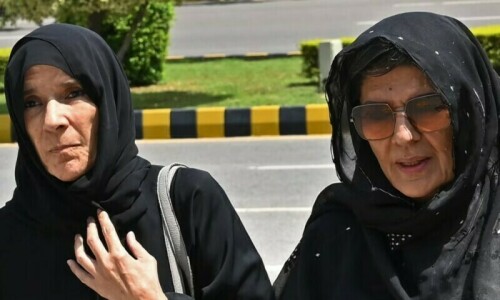A leopard, probably on an evening stroll, strayed into a residential area last month, forcing wildlife officials armed with tranquiliser darts to capture the animal in a frenzied effort, lasting more than five hours.
In videos posted to social media of the Feb 16 incident, the young male cat slipped between cars before knocking down a man and leaping over a garden fence. Before being captured, it ran amok in the streets of Islamabad’s DHA neighbourhood and even injured four people.
The wild episode has once again turned the spotlight on urban areas encroaching on natural habitats, and the practice of keeping big cats as pets — wildlife officials initially assumed that the leopard was a pet and had escaped from captivity, but they later said it came from the wild as it showed no signs of being domesticated.
However, reports have earlier suggested that several people in upscale areas keep wild animals as pets, as some owners see big cats — such as leopards, lions and tigers — as symbols of wealth and power.
Other wild animals kept as pets in Pakistan include snakes, iguanas, pangolins and birds, some of whom are from other countries.
The DHA incident — that made some wildlife officials name the leopard ‘Deeaitchay’ — has also called into question the laws, or a lack of them, governing the captivity of wild and exotic animals.
Islamabad’s leopard incident turns spotlight on shrinking natural habitats, big cats kept as pets, and related laws
The existing laws are sometimes unclear, not comprehensive, and differ from province to province. Wildlife officials and organisations have called for more comprehensive laws in this regard.
Islamabad and Punjab
The Islamabad Wildlife (Protection, Preservation, Conservation and Management) Ordinance 1979 (IWO) prohibits killing and capturing wild animals, restricts their hunting, transfer and import, and empowers authorised officers to search any place without a warrant if someone keeps a wild animal.
The ordinance also gives a long list of protected animals — those that “shall not be hunted, killed or captured” — ranging from birds like pelicans, flamingos, geese, and swans to mammals like barking deer, otters, pangolins and leopards.
But the IWO apparently has no jurisdiction if someone wants to keep lions and tigers, which are not native and not described as wild under laws.
However, all provisions concerning wild and foreign animals have now been included in the draft Islamabad Nature Bill, said Vaqar Zakaria, a member of the Islamabad Wildlife Management Board (IWMB).
“We have been tabling it (the bill) in the parliament for the last three years, but it just doesn’t seem to come into the priority of things,” he told Dawn.
Mr Zakaria said the IWMB — a government body operating under the Ministry of Climate Change and was set up in 2015 under Section 4 of the Islamabad Wildlife Ordinance — had not issued a single licence for any naturally occurring wild animal since its inception.
There is no official data on how many people in Islamabad own wild or exotic animals. However, IWMB Director Tariq Bangash said in February that several people in Islamabad and upscale areas of Rawalpindi were keeping wild animals, including leopards, as pets.
As for Punjab, the provincial government issues permits for exotic animals such as lions and tigers.
However, Mr Zakaria regretted that if you mistreat a pet lion or a tiger in Punjab, the wildlife department cannot do much. “There’s nothing in the law that says that you should not be mistreating an animal. It stops there,” he said but added that the province was modifying laws to enable the department to keep a check on how the animals are kept.
Sindh
Sindh enacted a new wildlife law in July 2020 to protect 326 species of birds, 107 species of crawling animals and 82 species of other animals.
The legislation — called the Sindh Wildlife Protection, Preservation, Conservation and Management Act 2020 — came almost 50 years after a previous law that protected only 45 kinds of birds and animals.
The act also makes provisions, among other things, to set up a national park, game reserve, and wildlife sanctuary; regulate hunting; import and export captive breed animals; and offences and penalties.
Under the act, the lawful possession of any wildlife species has been attached with several stringent conditions, unlike the past practice of granting a two-liner official permit for setting up a mini-zoo, and that too without mentioning any specific species.
For instance, lawfully possessing exotic big cats is attached with 39 conditions, including one under which the owner is required to get the DNA certification for the animal, which can only be done at a handful of institutes across the country.
Besides, under the 2020 law, no new application for importing big cats will be entertained. The permit also bars citizens from keeping big cats in residential areas, and an applicant must acquire a no-objection certificate from the relevant union council, town committee and cantonment board.
Meanwhile, a wildlife expert told Dawn that there might be more than 100 captive big cats in Sindh, most of them in Karachi.
Khyber Pakhtunkhwa
Officials in KP said the provincial government had introduced stringent rules to control private breeding facilities.
A wildlife official said the provincial government notified the Breeding Facility Rules last year, which provides for registration of all such facilities with the department and paying taxes for the animals being kept.
These rules were passed under the Khyber Pakhtunkhwa Wildlife and Biodiversity (Protection, Preservation, Conservation and Management) Act, 2015.
The official said that illegal breeding facilities would be heavily fined and closed under the rules, which only allowed keeping birds and herbivores, and discouraged the captivity of carnivores.
Balochistan
The provincial government enacted the Balochistan (Wildlife Protection, Preservation, Conservation and Management) Act 2014 in March of that year.
The legislation provides a comprehensive list of wild animals in its Schedule III that must be protected. These animals — including big cats, reptiles like marsh crocodiles, snakes, etc. — shall not be hunted, killed, trapped, captured, traded, possessed or kept as pets.
“No official permit has been issued to anyone in Quetta to keep these as pets,” Niaz Khan Kakar, Balochistan’s forest and wildlife conservator, told Dawn, adding that under Section 25 of the act, all such pets would be confiscated.
More laws needed
The World Wildlife Fund (WWF) Pakistan, which has previously flagged several cases of big cats kept in residential areas and their open displays in public places, has stressed the need for provincial wildlife departments to establish a separate cell for handling and rescuing animals as soon as possible.
The Fund has also called for strict laws to be implemented against the illegal trade of wild animals and the practice of keeping them as pets. It stressed the need for new laws in the country that prohibit keeping wild animals, such as tigers and lions, as pets.
Manzoor Ali in Peshawar and Saleem Shahid in Quetta also contributed to this report
Published in Dawn, March 6th, 2023













































Dear visitor, the comments section is undergoing an overhaul and will return soon.